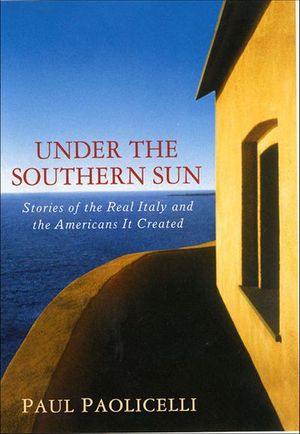Under the Southern Sun
Published by St. Martin's Publishing Group
A travelogue exploring southern Italy, its society, history, culture, and heritage, and the lives of famous Italian Americans descended from the region.
“Paolicelli…undertakes an illuminating journey of self-discovery…. Smashing conventional stereotypes of southern Italians, he opens a window onto an essentially unexplored cultural and geographical landscape.”—Booklist
Recently there has been a seemingly endless stream of books praising the glories of ancient and modern Rome, fretting over Venice’s rising tides and moldering galleries, celebrating the Tuscan countryside, wines and cuisine. But there have been curiously few writings that deal directly with Italy as the country of origin for the grand- and great-grandparents of nearly twenty-six million Americans. The greatest majority—more than eight out of ten—of those American descendants of immigrant Italians aren’t the progeny of Venetian doges or Tuscan wealth, but are the diaspora of Southern Italians, people from a place very different than Renaissance Florence or the modern political entity of Rome. Southern Italians, mostly from villages and towns sprinkled about the dramatic and remote countryside of Italian provinces even now tourists find only with determination and rental cars.
In Under the Southern Sun: Stories of the Real Italy and the Americans It Created, journalist Paul Paolicelli takes us on a grand tour of the Southern Italy of most Italian American immigrants, including Calabria, Basilicata, Puglia, Sicily, Abruzzo, and Molise, and explores the many fascinating elements of Southern Italian society, history, and culture. Along the way, he explores the concept of heritage and of going back to one’s roots, the theory of a cultural subconscious, and most importantly, the idea of a Southern Italian “sensibility”—where it comes from, how it has been cultivated, and how it has been passed on from generation to generation. Amidst the delightful blend of travelogue and journalism are wonderful stories about famous Southern Italian–Americans, most notably Frank Capra and Rudolph Valentino, who were forced to leave their homeland and to adjust, adapt, and survive in America. He tells the story of the only large concentration camp built and run by the Fascists during World War II and of the humanity of the Southerners who ran the place. He visits ancient seaside communities once dominated by castles and watchtowers and now bathed in tanning oil and tourists, muses over Matera—what is probably Europe’s oldest and most unknown city—and culminates in a fascinating exploration of how one's familial memory can influence his or her internal value system.
This book is a celebration of Southern Italy, its people, and what it has given to its American descendants.
“A splendid portrait, vivid and affecting.”—Kirkus Reviews
BUY NOW FROM
COMMUNITY REVIEWS

